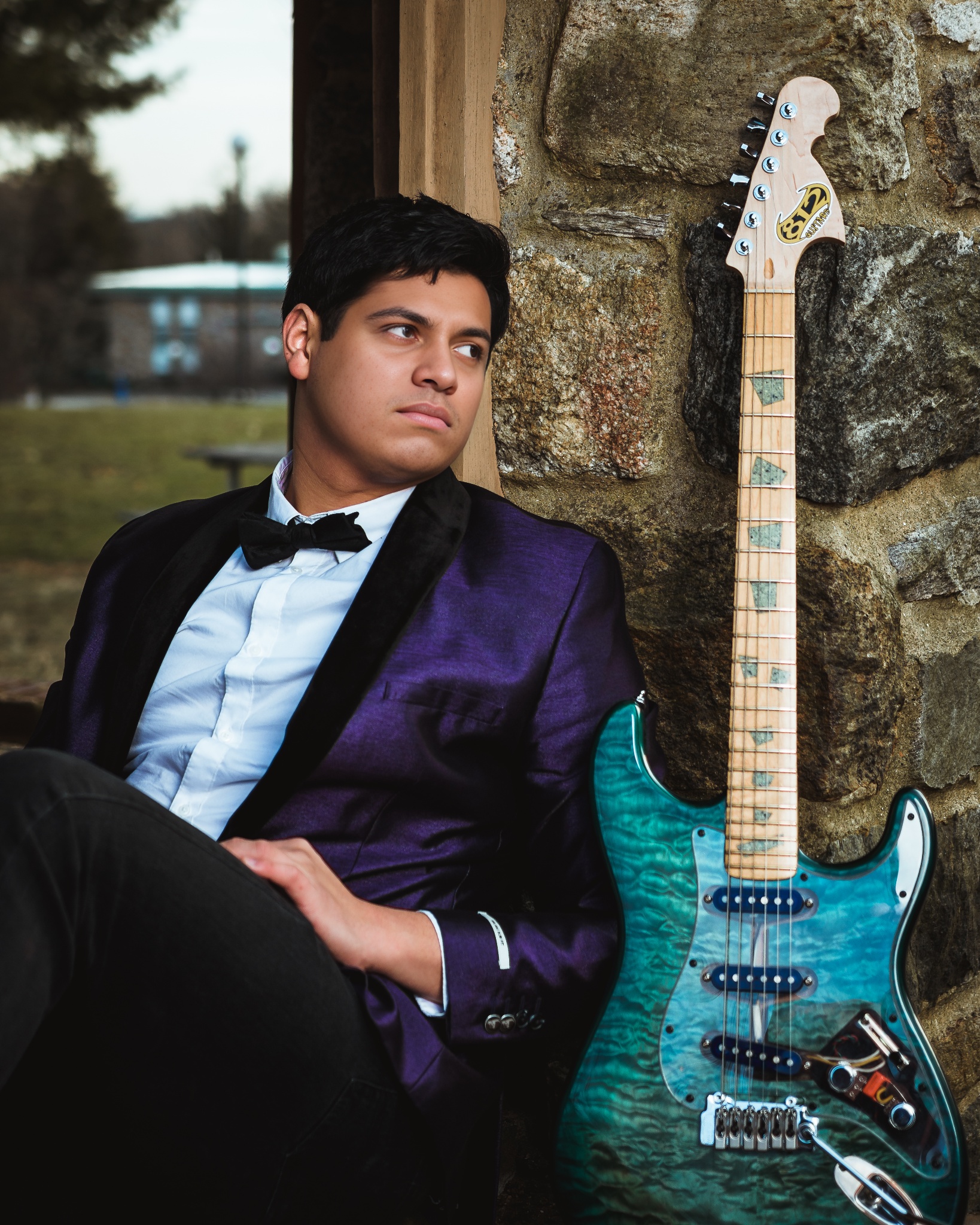When we think of Chuck Berry, the images of his duck-walking performances and the unmistakable intro to “Johnny B. Goode” instantly spring to mind. Despite being the first electric guitarist to draw a crowd of mimics, Chuck Berry’s influence on the electric guitar in rock ‘n’ roll was undeniable.
In this article, Eguitarmania promises to unpack the layers behind Berry’s legendary status. Let’s find out the influence of Chuck Berry on rock and roll? We give you a fuller understanding of Berry’s art and his place in music history by breaking myths and bringing to light parts of his work that have been forgotten.
Berry’s Songwriting
Chuck Berry, the first performer on “classic rock” to return since 1979 with the announcement of his first new album in over three decades, “Chuck,” was set to drop this year.
From the Rolling Stones and the Beatles to almost every garage band or stadium act that claimed to be rock ‘n roll, his impact was immeasurable, despite the fact that his core repertoire only consisted of around thirty songs.
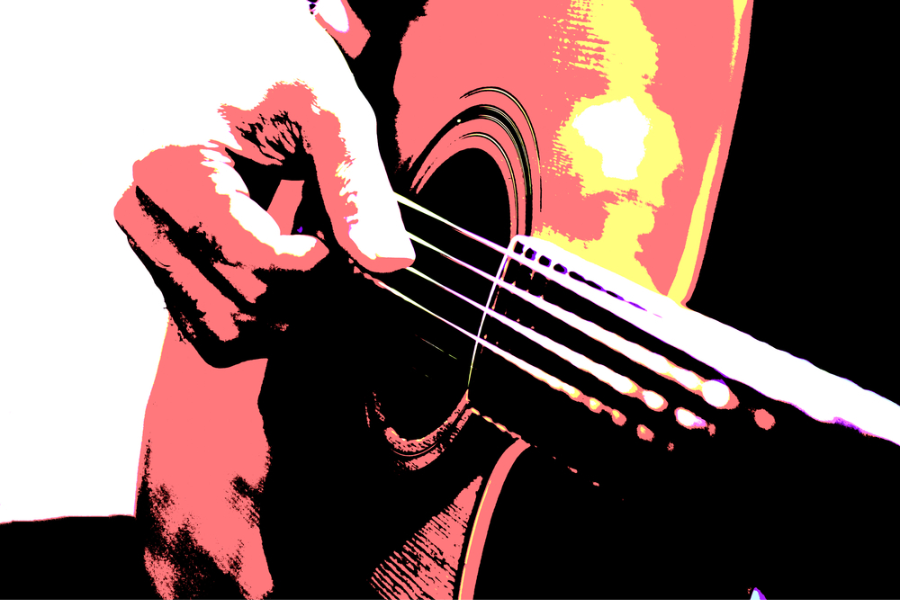
Berry wrote songs that resonated with young people in his late twenties and continued to do so even after all these years. “Sweet Little Sixteen” was a sweet tribute to the young women who would become known as “groupies” in the rock ‘n’ roll era.
When the last bell sounded in “School Day,” the students were free to rock ‘n’ roll after enduring the sung-along challenges of the classroom (“American history and practical math; you’re studying hard, hoping to pass…”).
Both “Roll Over Beethoven” and “Rock and Roll Music” served as hymns to the revolutionary force of rock and roll, with the former serving as a blueprint for subsequent bands (“It’s got a back beat, you can’t lose it”). There was no assurance that the drive-ins and corner cafes praising “Back in the U.S.A.” would serve Berry during the time he was writing it, so it was a black man’s honest homage to his nation.
“Music should be made to make people forget their problems, if only for a short while.”
Chuck Berry
One of the most thrilling records in the history of music is “Johnny B. Goode,” which was Berry’s hallmark song. It depicts the story of a farm boy who plays guitar and whose mother assures him he’ll be famous.
Johnnie Johnson, a boogie-woogie pianist who worked with Berry on several songs, had an influence on the song. At least one generation of artists was inspired by his clarion voice, which combined elements of country flare with rhythm and blues energy.
The Influence Of Chuck Berry On Rock And Roll
Chuck Berry was great at telling stories. His songs were like vivid pictures of everyday life in America, capturing the hopes and dreams of an age.
Chuck Berry’s impact on live performances in Rock ‘n’ Roll
His ability to tell stories in his music made listeners feel like he was singing just for them. Folk songs like “Johnny B. Goode,” “Maybellene,” and “Sweet Little Sixteen” told stories that people could relate to by combining complex plots with new musical ideas. The way Berry used familiar themes and stories to connect with his fans set a new bar for rock ‘n’ roll songwriting.
Chuck Berry’s guitar playing was something no one had heard before, full of fast notes and special tricks that made his songs stand out. He mixed different types of music, like rhythm and blues, with country to create something totally new and exciting. Popular songs like “Johnny B. Goode” turned into anthems for teens and young adults seeking fun and freedom.
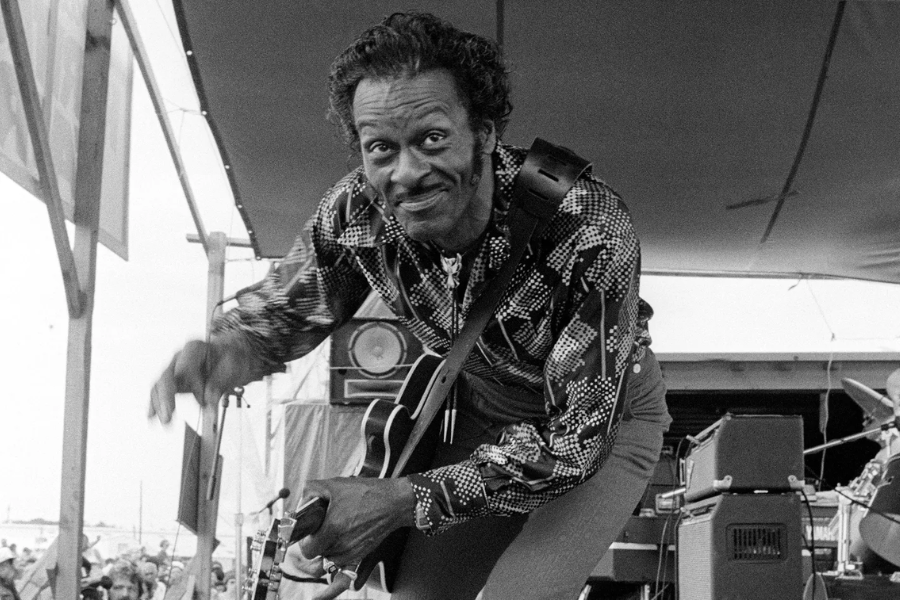
He certainly knew how to put on a memorable live show. Beyond the music, his famous duck walk and the way he played the guitar were also very important.
He proved that acting was more than just singing songs; it was also about putting on a show that people wanted to see. Many musicians who came after him used this idea, which made live rock shows exciting.
Artists Inspired by Chuck Berry
Chuck Berry influenced countless artists across multiple generations. Known as the “Father of Rock ‘n’ Roll,” Berry’s innovative guitar playing and catchy rhythms shaped the sound and spirit of rock music.
The Rolling Stones
The classic rock band The Rolling Stones got a lot of their ideas from Chuck Berry. Berry’s “Come On,” which The Stones covered for their first song, was a clear tribute to their hero. Keith Richards, who played guitar for the band, looked up to Berry’s style and used many of Berry’s methods in his own playing.
Their big thing is creating awesome guitar riffs (the catchy part of the song that gets stuck in your head) and putting on a show that keeps you on your feet. The band has often said that Berry was a big part of how they developed and became what they are today.
The Beatles: From Across the Pond
The Beatles, who were one of the most important bands in rock history, loved Chuck Berry the most. Berry’s style is known for putting stories into songs that still sound light and easy to understand.
The Fab Four liked Berry’s mix of rhythm and blues and country music, and they covered a number of his songs, such as “Roll Over Beethoven” and “Rock and Roll Music.” People often quote John Lennon: “If you tried to give rock and roll another name, you might call it ‘Chuck Berry.'” Berry had a big effect on the British Invasion and on The Beatles’ music in particular.
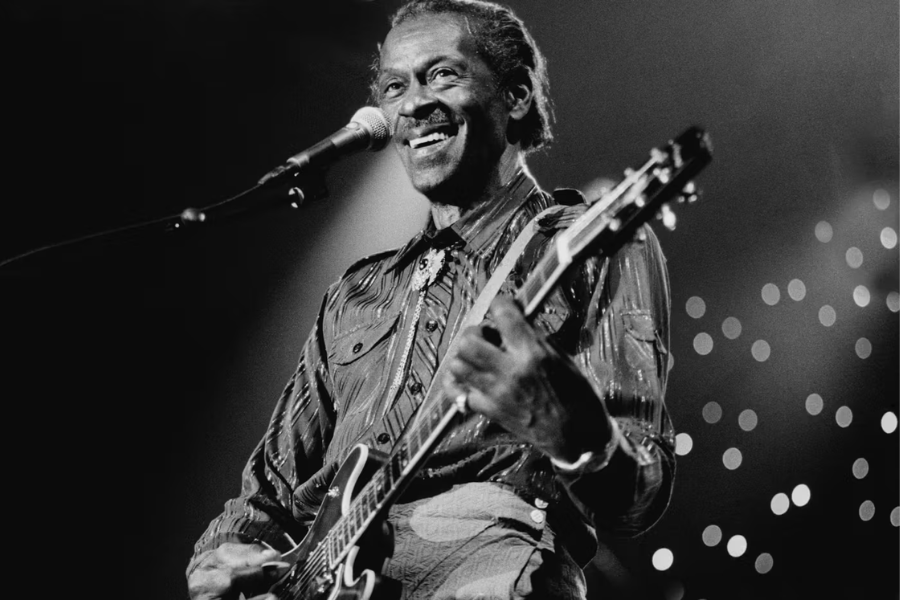
Jimi Hendrix
Berry also had an effect on Jimi Hendrix, who was famous for his complex sounds and amazing guitar skills. Moreover, he loves Berry for his ability to command the stage with just his presence and his instrument. While Hendrix’s style was more psychedelic and far-reaching, the roots of rock guitar playing that Berry established are evident in Hendrix’s performances.
Hendrix even covered Berry’s “Johnny B. Goode” as a tribute to his influence. He expanded on Berry’s legacy by experimenting with feedback, distortion, and extended solos, forever changing the way the guitar is played in rock music.
Bruce Springsteen
Bruce Springsteen, whose songs are about stories and live shows are full of energy, is a straight cousin of Berry’s musical heritage. Springsteen is great at telling stories, and his songs are mostly about freedom, revolt, and the American dream, just like Berry’s. Springsteen has often played Berry’s songs in concert, and he has even sung backup for Berry during a show, which shows how much he admires and respects Berry.
Legacy and Recognition
The lasting impact of his music on the genre and future generations
His influence was musical as well. He helped popularise the guitar-riff based song. His songs were instantly remembered because of the catchy riff he played on his ringing guitar. One of them sounding like Johnny B. Goode was enough, even though they all started to sound like him after a while. Keith Richards, for example, found Berry’s way of writing songs very inspiring and used it in his early and, let’s be honest, later work with the Stones.
Lyrically, he was a big influence as well. Berry was among the first to write music directly for his teen audience. His songs were about cars, the sun, dances, teen life, and generally underage things. He wrote lyrics that targeted the people who wanted to buy the music and was a direct influence on artists like The Beach Boys who took his lyrical style as a direct blueprint (and the tune of Sweet Little Sixteen for Surfin USA).
Play Like Chuck Berry
Chuck Berry Amps option
Berry switched to bigger amps like the Fender Twin Reverb and the Showman as his career grew and he played bigger settings. Berry’s high-energy shows had more noise and power thanks to these amps, which could handle bigger crowds.
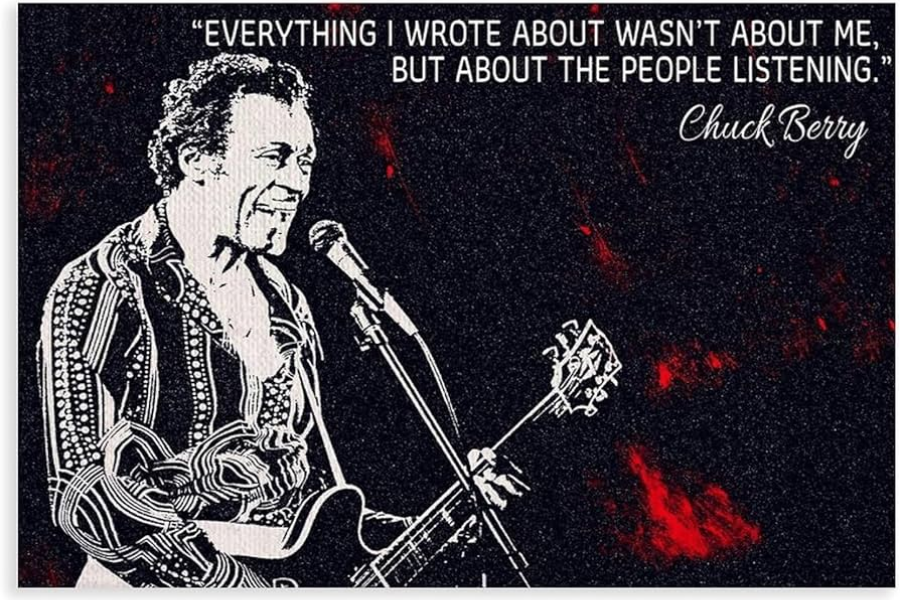
Berry used amplifiers made by brands including Gibson, Vox, and Marshall, in addition to Fender. The variety of tones produced by these amplifiers gave Berry a lot of leeway to play around with his sound. Onstage, he often used a patchwork of amplifiers to get a richer, more dramatic sound.
Guitar Did Chuck Berry Primarily Play
Chuck Berry, the legendary guitarist, was known for his iconic sound, primarily achieved through his beloved Gibson ES-350T semi-hollow electric guitar. Throughout his illustrious career, he also occasionally showcased his talents on a Fender Telecaster and a Guild Starfire.
Final Thought
In rock ‘n’ roll, Chuck Berry had a huge effect on the electric guitar, mostly because of the way he played, including the way he used guitar leads and riffs in new ways. But the use of modern guitar effects or technology that became popular in later years did not have an effect on his fame. Berry was influential because he was good at rhythm, tune, and stage presence, not because he used pedal effects or amplification in the way that rock guitarists would in the future.

